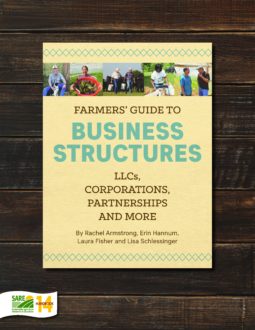Sole proprietorships and general partnerships are the easiest business entities to set up and maintain. In fact, nothing is actually required to create them. You may already be operating one without even knowing it! For example, if you own your farm operation and you’re not on an employer’s regular payroll for the work you do, you are automatically a sole proprietor. If you and a friend or a group of friends are doing it together, you are automatically a general partnership. It may very well be that you want to maintain this simplicity and are not at all interested in officially forming a business entity. This chapter highlights some risks involved in keeping your farm operation as a sole proprietorship or general partnership, as well as what you can do to protect your interests along the way.
| At-A-Glance Chart: Sole Proprietorship And General Partnership | ||
|---|---|---|
| General Concept | Sole Proprietorship | General Partnership |
| Name | “Your Name,” unless register a different “DBA” (doing business as) name | “Your Name,” unless register a different “DBA” (doing business as) name |
| Owners/investors are called | “Owner” | “Partners” |
| Persons who make management decisions are called | “Owner” | “Partners” |
| Creation document is called | None | None |
| Organizing document is called | None | “Partnership agreement” (optional) |
| An ownership share is called | “Contribution” or “investment” | “Contribution” or “investment” |
| Not relevant—sole owner owns all | “Ownership interest” or “equity” | |
| A payment of the company’s profits to the owners is called | Not relevant, as the personal assets and business assets are not separate. So all the profits that come in are one and the same. | “Distribution” |
| Is there personal liability? | Yes, there’s no protection of personal assets from the business’s liabilities. | Yes, there’s no protection of personal assets from the business’s liabilities. |
| How many participants can you have? | One | Two or more |
| Is an EIN necessary? | Not required | Not required |
| Who files the tax return? | Pass-through. Individual owner reports and pays taxes on the business’s earnings when filing an individual tax return. | Pass-through. Partners each report and pay taxes on their share of the business’s earnings when filing their individual tax returns. |
